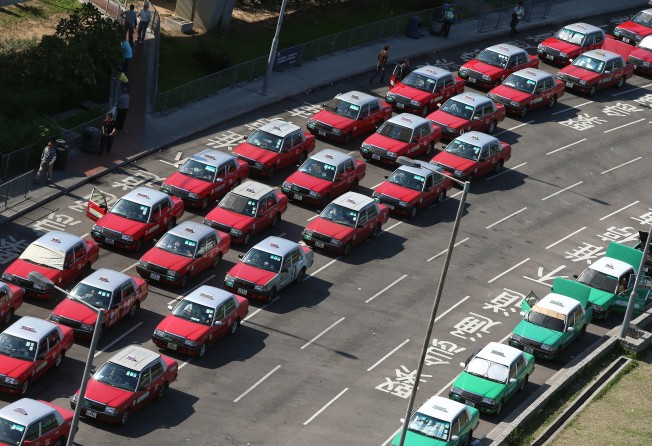
Surge in complaints against Hong Kong taxi drivers as passengers complain of rudeness, overcharging and hire refusals
Rise in rudeness, overcharging and hire refusals as rivals Uber move in

A new front has opened up in the battle for Hong Kong's streets with new figures revealing a dramatic rise in passenger complaints against drivers of the city's 18,000-strong traditional taxis.
News of the surge in complaints - covering everything from rudeness to refusing a fare - comes at the end of a week which re-ignited the debate over the near monopoly enjoyed by Hong Kong's traditional red, green and blue cabs after a police clampdown on the city's biggest and newest cab-hailing app operator, Uber.
Official figures obtained by the Sunday Morning Post show that among the top complaints were taxi drivers refusing a hire, overcharging and not taking the most direct route. The numbers for each complaint increased five-fold over the past 11 years.
The traditional taxi industry has conceded it is failing to serve customers properly, as dissatisfied customers turn to alternative private car services such as Uber.
Since the Transport Complaints Unit - which comes under the Transport and Housing Bureau - started compiling figures on taxi services in 2003, the number of complaints has topped 93,728.
The Legislative Council's Transport panel chairman Michael Tien Puk-sun said the true complaint figures against taxi services "are a multiple of" the current numbers.
This is despite the number of taxi drivers and licences being frozen since 1994 to protect the influential industry.
In almost each and every year, malpractice has risen.
Last year, complaints topped 10,060 - the first time the number has hit five figures - accounting for almost 50 per cent of the unit's complaints across public transport services.
The number of taxi drivers refusing hires jumped to 2,498 cases last year from 596 cases in 2003. Overcharging allegations climbed to 1,577 from 323, and cases of taxi drivers not taking the most direct route climbed to 1,731 from 890.
"Taxi driver misconduct has spread into many areas, which is why there is public demand for support for online hire-car services like Uber," said Tien.
"If you think about what Uber is offering, it is directly focusing on these complaint areas."
Referring to the increasingly bad reputation of taxi drivers, Eddie Wong Chung-keung, former chairman of the Hong Kong Taxi and Public Light Bus Association, said: "It's a reality".
"We even complain about the taxi drivers ourselves," Wong said.

"The government has all along been striving to assist in maintaining quality taxi services," the spokesman said.
A two-pronged approach was being adopted for tackling malpractice, according to the government, using the police to take vigorous enforcement actions, while the Transport Department educated drivers on the law.
Taxi passengers are being urged by the Transport Department to self-police the service.
Overall just 1.6 percent of the 93,728 complaints of malpractice were summonsed to court.
Wong, of the taxi trade industry, said: "The main problem is that the quality of taxi drivers has been declining over the past few years."
An earlier version of this article incorrectly stated that the number of complaints of malpractice receiving a court summons is 93,728, not 15,740, as previously stated. The Post regrets the error.